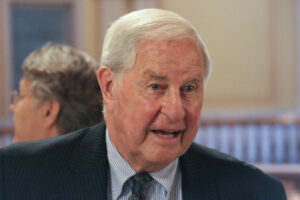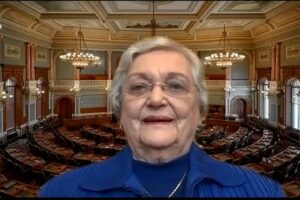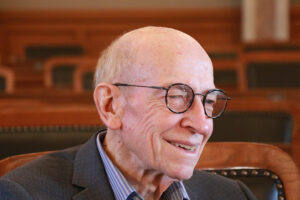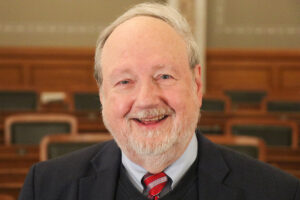Topic: Legislative leadership

Interview of Edward (Ed) Reilly, July 2, 2019
Interviewed by Dale Goter
In his 2019 oral history interview former State Senator Ed Reilly recalls controversial issues that went through the Senate Federal and State Affairs Committee during his tenure as chair (1971-1992). Those issues include the death penalty, liquor by the drink, lottery, pari-mutuel wagering, and casino gambling, some of which required adoption of Constitutional amendments. Reilly attributes the acceptance of those cultural changes in part to the need to raise additional state revenue. Reilly recalls professional relationships with the Statehouse press corps and the influence of grass-roots interests. He observed the increase in the number of women in the Legislature and Show Morecomments about their contributions. Show Less

Interview of Robert (Bob) Storey, February 5, 2015
Interviewed by Burdett Loomis
Bob Storey in his 2015 oral history interview recalls his service in the Kansas Senate from 1969-1976. His recollection is of a senate that was in transition in terms of urban-rural influence on policymaking due to the one-person, one-vote principle enunciated by the U.S. Supreme Court in the mid-1960s. He recalls intricacies of interactions among senate leaders and governors and occasional intrigue in senate leadership elections. He also reflects on improvements in the functioning of state government during the years when reorganization and modernization of many state functions took place.

Interview of Jene Vickrey, September 11, 2020
Interviewed by Alan Conroy
Jene Vickrey talks candidly about his first campaign (where he narrowly defeated then-Speaker Marvin Barkis) as having not much money but "a lot of shoe leather." He discusses his political mentors, Melvin Neufeld and Tim Shallenburger and the advice they gave him in the early years, about lobbyists and handling hot-button issues. He learned not only from his mentors, but other colleagues who helped him, some of whom were Democrats. The interview covers bills he sponsored, many of which were pro-life legislation. He describes the "tough challenges" such as foster care systems (he was a foster Show Moreparent), school finance and taxes. He didn't support casino gambling although his constituents were in favor of it. The interview concludes with Vickrey reflecting on the changes he saw in 28 years, the growth in the number of conservatives and a loosening of the control of the House from leadership to the body itself by rules changes for more transparency as well as becoming more partisan. Show Less

Interview of Donna Whiteman, January 19, 2018
Interviewed by H. Edward (Ed) Flentje
Former Representative Donna Whiteman's 2018 oral history interview provides detail about how the legislature functioned from 1983-1991. She describes the culture as less demonizing, more collegial and civil than is generally assumed by the public. Whiteman rose to a leadership position fairly quickly and became Majority Leader when the Democrats gained the majority in the House in 1991. One of Whiteman's assigned roles was to work with a group of Republicans called "The Rebels" - seven to nine members who would vote with the Democrats on certain bills. Whiteman also describes in some detail her Show Moreexperiences as a member of Governor Joan Finney's cabinet, particularly on issues such as foster care, long term care, and children and families. She observes that "after all the struggling in the 1991 session, the 1992 session is the shining star of progressive activity" and that the Children's Initiative produced visible, tangible, and beneficial legislation.
A version of this interview is also posted on KansasMemory.org, the website of the Kansas Historical Society. Show Less

Interview of Ardena Matlack, April 8, 2021
Interviewed by Joan Wagnon
Ardena Matlack describes the Kansas House of Representatives in the 1970’s when so few women were in the Kansas Legislature. Additionally, her second term she experienced being in the majority as a Democrat—something that seldom occurred. While in the majority, she started on the Federal and State Affairs committee as Vice-Chair, and moved up to chair the committee the second year of her term. The committee dealt with the ERA, abortion, liquor and a host of controversial issues. She also served on the Judiciary committee. Her discussion of gerrymandering shows the difficulty in dealing Show Morewith reapportionment that led to her husband losing his Senate seat and encouraging her to run for the House. She also dealt with environmental issues and water issues, particularly in Sedgwick County. Matlack worked with Treasurer Joan Finney to get the first Unclaimed Property law passed. Show Less

How Things Got Done in the Kansas Legislature
In this video, compiled from interviews on this site, 12 former Kansas legislators who served from 1960-2010 talk about why they ran for public office, how they developed and executed strategy, and how different leaders perceived their roles and what they accomplished. Among others you will hear Dick Bond describe initiating renovation of the Capitol, Steve Morris recall creating a plan to train more engineers, and Fred Kerr explain the need for reappraisal and classification. You also hear Mike Hayden recount lessons learned from two Speakers with vastly different styles who preceded him – Pete McGill and Wendell Show MoreLady. Show Less

Interview of Jim Maag, September 28, 2021
Interviewed by Joan Wagnon
The Kansas Oral History Project reviewed the original transcript of Dr. Burdett Loomis's interview of Representative Jim Maag and decided to recapture part of the interview on video for inclusion in a civic education series about the Kansas legislature. This videoed interview follows the original Loomis interview, asking similar questions. A transcription of the video is also posted here. In the original 2014 oral history interview, Jim Maag reflected on his service in the Kansas House of Representatives (1969-1976) including his term as Speaker pro tem (1975-1976). In this reprise of that interview, Maag's words come to life. Show MoreMaag's years in the House spanned a time of significant change and modernization of the Kansas Legislature and its processes. He provides a view into the evolution of the Legislature into a more professional organization. He comments on the bipartisan approaches to policymaking during that era when the urban-rural split affected the dynamic more often than purely partisan considerations. Maag was witness to the impact of the one person, one vote U. S. Supreme Court decision as well as the increased number of women legislators, and the reduced number of attorneys. Jim's recollections draw a vivid picture of an institution in transition. His connection with the Legislature continued in his role of legislative liaison for Governor Bennett and later as a lobbyist for the Kansas Bankers Association. Show Less

Interview of Delia Garcia, April 21, 2022
Interviewed by Frances Jackson
Garcia's interview describes how she was recruited to run for the Kansas Legislature and how she learned how to be a successful leader. She had many role models from Texas Senator Leticia Van der Putte, to Governors Finney and Sebelius, and Sr. Therese Bangert. She told a story about a legislative colleague who complimented her on speaking good English while she was debating a measure requiring English as the official language. Garcia felt humiliated and angry, but one of her mentors talked her out of quitting. She used that experience to begin intentionally training women, Show Moreparticularly women of color, to run for political office. She has written a book on national Latina leadership, to be published at the end of 2022. Garcia also shares her thoughts on immigration and immigrant rights. She cites the fact that Kansas was the fourth state in the country to pass in-state tuition for undocumented students in 2004. To her, immigration policy has an economic impact. Congress should be willing to come to the table and talk, discuss and even compromise to find a solution. The interview concludes with a description of a program at Wichita State University that invests in developing leadership for students. Show Less

Interview of Richard Walker, December 2, 2022
Interviewed by Nancy Parrish
Richard Walker's interview shows the human side of being a judge for 30 years in his hometown of Newton. After a brief foray into politics while fresh out of law school and the private practice of law, Walker found his niche on the bench in his hometown of Newton/Harvey County. His descriptions of a group of young Republican lawmakers organizing to elect Wendell Lady as Speaker are interesting. Walker became disillusioned about the parole board practices during his service there but saw a way as a judge to look for creative, flexible alternatives to Show Moreresolving domestic situations and preventing children from being damaged in the process. In 2015 he moved to senior judge status and worked with the Court of Appeals, largely because "he had had it with domestic cases." Show Less
